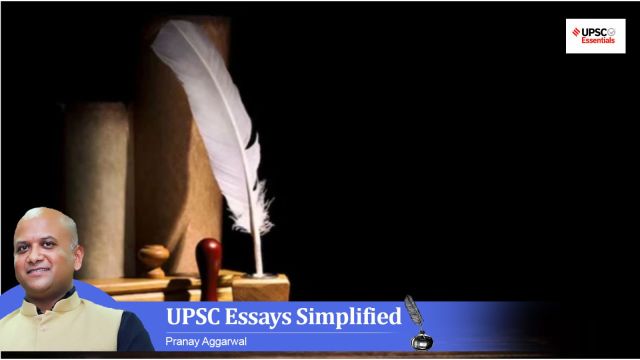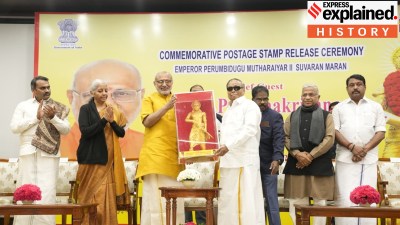There is a pleasure in philosophy which every aspirant feels, until it appears as an unavoidable component of the UPSC CSE Essay paper. Is it so? In the past few years, the Essay paper of UPSC CSE has started focussing completely on philosophical quotes. This shift in trend has become a big challenge for aspirants in their UPSC journey. Aspirants often ask — Are there any boundaries for essays based on philosophical quotes as they seem open-ended? Can quotes be linked to contemporary times? They are all valid questions. There can be different ways to answer your doubts. One of them is providing a sample essay written by an expert.
In UPSC Essentials’ special series ‘UPSC Essays Simplified’, we take you through some of the sample essays written by our expert Pranay Aggarwal covering questions of past years. The topic dealt with today was asked in the essay paper of UPSC Main Exams 2022.
‘Poets are the Unacknowledged Legislators of the World’ is a quote from P.B.Shelley’s essay, The Defence of Poetry. Should this information be a starting point for your essays? Or Should you attempt an essay only if you know its source? Not necessarily. Understanding and decoding the essay topic, ideation, structuring and many other factors should be the prerequisites to your choice of the essay. Let’s now have a look at this sample essay.
‘Poets are the Unacknowledged Legislators of the World’
— By Pranay Aggarwal
“Where the mind is without fear and the head is held high
Where knowledge is free
Where the world has not been broken up into fragments…”
Story continues below this ad
These words of Tagore, that I came across as an eighth grader, continue to fascinate, inspire, and rouse me today. They gently changed me, from a carefree child into somewhat of a concerned and engaging citizen. Quite likely, many of us have similarly come across an inspiring poem, a pithy Doha, or a beautiful Shloka which we still ‘carry’ with us. Magnify from the individual to the societal level, and one can sense how poets and their works affect our world.
While poets may not draft laws and govern states, they wield an invisible but undeniable influence – shaping society’s values, ethics, and collective consciousness. In more ‘stable’ times, poets serve as a society’s moral guides, custodians of its traditions, and social commentators. During times of tumult, they can become its worst critics, activists, and dissenters.
Poets may not wield formal authority, yet, through their words, they shape our understanding of the world. In this sense, they ‘legislate’ not in parliaments but in the hearts and minds of people! To understand its full import, we must delve into how poetry, quite like law, helps to preserve culture, affects society’s values, and serves as a unifying force; while also shaping young minds and offering societal critique. This essay attempts to do so, tracing how the works of poets influence human thought and actions.
Preserving Culture
Poets, well aware of their own temporal position, engage in a dialogue with the past and the future. Through this engagement, they provide continuity in a constantly evolving world. Poetry transmits cultural values, connecting generations through shared stories.
Story continues below this ad
Adi Kavya Ramayana is not only the life story of Shri Rama, but also a repository of the values of a billion people. In his work, Valmiki immortalized Shri Rama and transcended storytelling to impart lessons on duty and dharma. His verses have inspired generations to contemplate the nature of honor, loyalty, and duty, shaping social values for millennia. Ved Vyasa, in Mahabharata, delivered to us the divine song of Bhagwat Gita; which has served as a moral guide for generations.
Although these poets did not hold power and are long gone, their influence remains, shaping our collective morality and ethics.
Cultivating Young Minds!
Poetry often encapsulates a simple yet profound idea, conveyed beautifully. Children’s poems carry moral messages that shape young minds. Nursery rhymes often teach values of honesty, loyalty, and sharing. These poems are thus ‘legislation’ that guides future generations, embedding morals in them through rhyme and rhythm.
Fostering Oneness
A Constitution unites all those whose lives it governs. Poetry can also serve as a powerful tool for unity. Consider the unifying force of national anthems. Jana Gana Mana is a poetic celebration of India’s diversity and unity. Tagore’s composition is not just a poem but also a reminder of our common heritage and shared identity, inspiring patriotism in all Indians.
Story continues below this ad
Mirror of Society
The power of poetry lies also in its ability to reflect, critique, and inspire. Since long, poetry and literature have been preferred mediums for introspection and societal critique. Poetry often holds up a mirror to society, capturing both its light and shadows. Poets use art for social commentary, encouraging people to examine oppressive political regimes, economic inequalities, and systemic injustices. By exposing societal flaws, poets encourage people to envision a better world.
The dohe of Kabir, for instance, address issues like caste discrimination, ritualism, and religious orthodoxy. Kabir’s couplets, without formal authority, shaped society’s ethics, challenged prevailing structures and advocated reforms. Quite like lawmakers, poets like Kabir thus influence societal values.
Today, unsung online poets continue this tradition. Websites, social media, and literary blogs feature countless poets who address contemporary issues ranging from climate change and racial injustice to sexual freedom and mental health. Without recognition, these modern poets foster a collective consciousness. By capturing the anxieties, hopes, and dreams of our times, they influence social narratives and public opinion and, indirectly, policies.
Emotional Connect
A unique quality of poetry is its ability to connect with people on an emotional level, bypassing intellectual defenses and appealing directly to the heart. Through metaphor and symbolism, poets communicate truths that resonate deeply. This emotional connection is powerful as it appeals to shared human experiences, evoking empathy, a key ingredient for social cohesion.
Story continues below this ad
Poems by Rumi and Gibran explore themes of love and loss, invoking a sense of shared humanity. Although they did not govern states, their words promote a worldview that influences individuals and, by extension, societies. The anonymous poets on the internet offer similar guidance in our times. Through their unfiltered reflections, they influence individuals’ inner lives.
Poetry and Protest
In times of socio-political upheaval, poetry often comes in handy. During the independence movement, poetry was a powerful medium for fostering national pride and resistance against colonial oppression. Bankim Chandra’s Vande Mataram became the rallying cry of the freedom struggle. The 20th century African-American poet Maya Angelou used her words to reveal the injustices of racial discrimination, catalyzing momentum for civil rights in USA. Bob Dylan’s lyrics became an anthem for the American anti-war protestors. Even today, verses from Faiz’s “Hum Dekhenge” resonate in protests across India, reminding us of poetry’s power to inspire hope and resilience!
Slogans, chants, and verses unify voices and communicate ideals. Through rhythm and symbolism, poetry captures the essence of human struggles, encouraging individuals to strive for a better future.
Unacknowledged Legislators
Although poets profoundly influence society, their role is seldom recognized. Society honors lawmakers, administrators, and industrialists, who are more directly credited for societal progress. The contribution of poets is far more subtle, symbolic, and somewhat abstract.
Story continues below this ad
Not only the innumerable unsung poets, even many of those we celebrate today were not acknowledged in their own times. Ghalib died penniless. Only 10 of Emily Dickinson’s 1,800 odd poems were published during her lifetime. Thoreau, too, died in relative obscurity. Examples abound.
Today, the internet has enabled umpteen unknown poets to share their work widely. Even as their poetry resonates with a worldwide audience, most remain uncelebrated.
Paradoxically, being ‘unacknowledged’ is what allows poets the freedom to explore, critique, and provoke without the constraints of institutional responsibility. In doing so, they provide society with an unfiltered vision.
In conclusion, by capturing the beauty, pain, aspirations, and complexities of human life; poets offer a mirror to society and a window to what it can become. They instill values, challenge injustices, and connect people across divides, fostering a consciousness that transcends the limitations of formal institutions.
Story continues below this ad
In an age dominated by scientific and technological progress, the contributions of poets may appear less crucial, yet their influence remains indispensable. For, while laws and policies govern behavior; it is poetry and literature that nurture conscience. Perhaps, legislation is not just about controlling actions but also guiding hearts and minds. It is through this invisible yet enduring influence that poets, in their unassuming way, indeed ‘legislate’ the world.
Expert Tip:

About our Expert: Pranay Aggarwal is an educator and mentor for aspirants preparing for UPSC Civil Services exam. With more than 10 years of experience guiding civil service aspirants, he is acknowledged as an expert on civil service exam preparation, especially on subjects like Social Issues and Sociology. He is the India representative on the Research Committee on Education, Religion and Political Sociology for UNESCO’s International Sociological Association and a committee member of Indian Sociological Society and its committee on social movements. He is also the Convenor of Indian Civil Services Association, a think tank of senior bureaucrats.
Subscribe to our UPSC newsletter and stay updated with the news cues from the past week.
Stay updated with the latest UPSC articles by joining our Telegram channel – Indian Express UPSC Hub, and follow us on Instagram and X.
Story continues below this ad
For your queries and suggestions write at manas.srivastava@indianexpress.com.



































